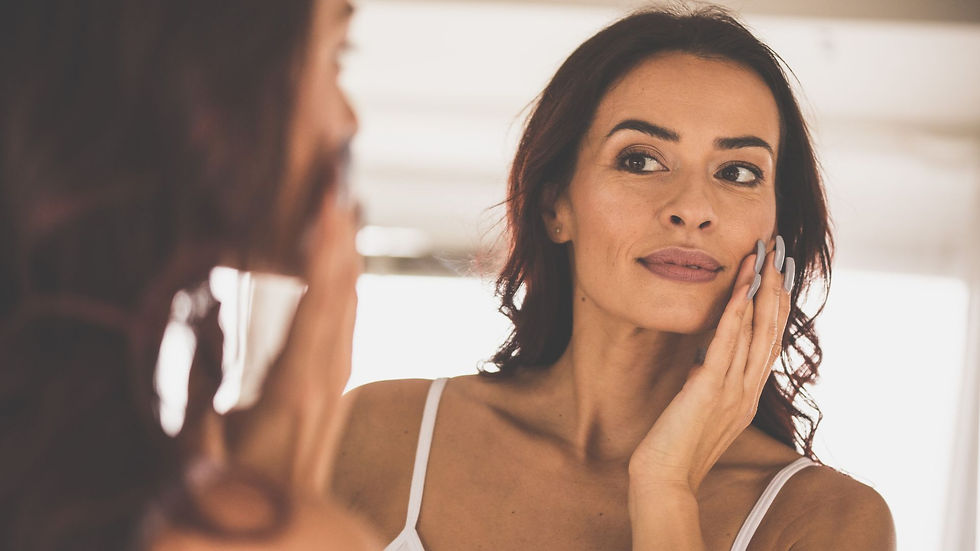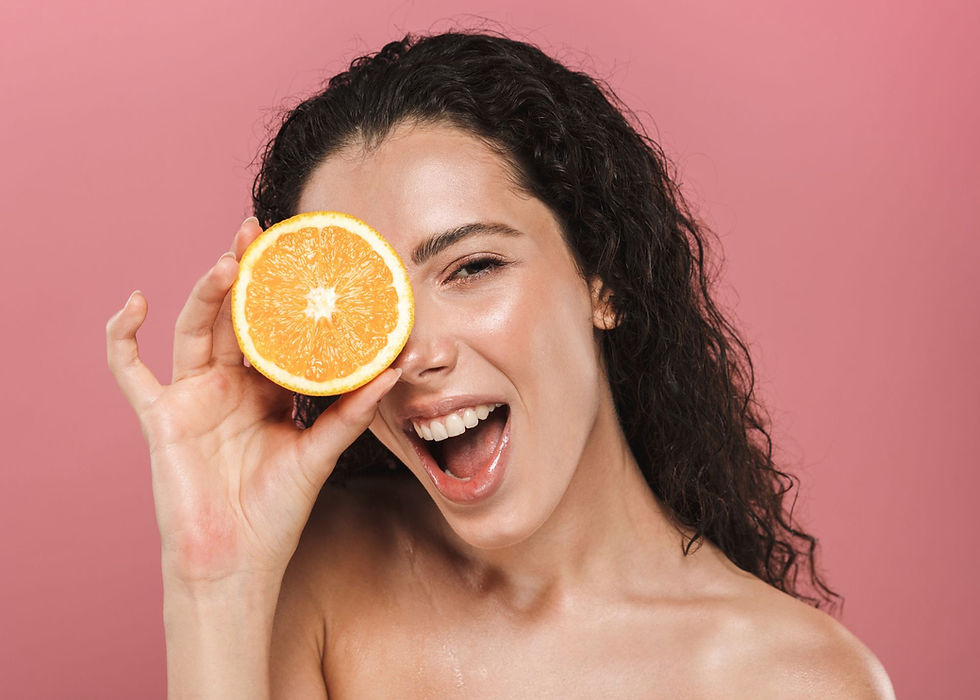Retinol and its great benefits
- Practical Skin

- 1 oct 2022
- 6 Min. de lectura
Actualizado: 27 oct 2022

Most skincare fans have heard of RETINOL, but few people understand what it really does. In this blog, we are going to explain in more detail about how retinol works, its benefits and the most frequently asked questions about this famous ingredient.
What you should know about Retinol
Retinol is a synthetic derivative of vitamin A, vitamin A is an essential nutrient that comes in two types: retinoids and carotenoids. Both types are converted into retinol by the body and stored in the liver or transported throughout the body. When applied topically, retinol can increase skin cell turnover and stimulate collagen production.
Retinol was first approved in the 1970s for use in acne patients, and has been found to be effective in promoting cell turnover and preventing clogged pores, as well as helping to improve blemishes and improve the way products penetrate the skin.
Retinol can make our skin look and feel softer, smoother, and with a radiant glow. In addition to diminishing fine lines and wrinkles while improving collagen production, the entire package in one single ingredient.

Top 5 Benefits of Retinol:
As we have already mentioned, retinol offers many benefits for your skin, but there are 5 main reasons why people buy and use retinol. Here we will detail these reasons more thoroughly:
#1 Retinol can clear up acne
By unclogging pores, retinol brightens skin and prevents further breakouts from occurring. Naturally, less acne will result in fewer acne scars.
Additionally, retinoids can amplify the effects of other medicated creams and gels, allowing you to get the maximum benefits from whatever treatment you're using.

#2 Retinol May Fight Signs of Aging
Relax! Retinol is one of the most widely used and well-studied anti-aging ingredients on the market. Originally marketed as an acne treatment in the 1970s, it quickly proved to have significant anti-aging effects.

#3 Retinol can help even skin tone
One of the many notable aspects of retinol is that it stimulates skin cell turnover, which manifests as a sort of "exfoliating" effect. Dull, dry skin gives way to new, brighter, more even-toned skin armed with increased levels of collagen and elastin. Thicker skin is stronger, smoother, and has fewer blemishes overall. Therefore, even relatively "trouble-free" skin can have radiant effects with the help of retinol.

#4 Retinol is profitable
Depending on your budget, investing in retinol may seem like an extravagant thing to do. However, spending on cheaper solutions in the short term may ultimately prove to be the most expensive option. Retinol is one of the only ingredients with scientifically proven benefits, making it a reliable investment for your future.

#5 Available by prescription or over the counter
For most people, an over-the-counter retinoid should be enough to get you started. The lower dose allows the skin to acclimate to the product with less risk of irritation. These lower doses of retinol also have fewer side effects than prescription strength retinoic acid.

How long does retinol take to work?
Retinol begins to work on our cells immediately, however, the time it takes to see results depends on a variety of factors, including but not limited to your skin type, product dosage, and amount of product applied. uses. In general, you can expect to see the benefits of retinol after about 12 weeks of consistent use.
In fact, in some cases, the skin condition may appear "worse" at first as you adjust to the new regimen, however this is a temporary issue (this is sometimes called a retinol purge), however, if you keep constant you will notice the results.

Include retinol in your routine
It's never too early to start using retinol for anti-aging purposes, as it's always better to prevent problems than to try to reverse them.
How is retinol used?
Before using a retinol product for the first time, test some on a small area of skin (a patch test) to see if you have any negative reactions. If, after a couple of days, your skin patch isn't very red or itchy, you can add retinol to your bedtime skincare routine.

FREQUENTLY ASKED QUESTIONS ABOUT RETINOL:
Can I use retinol around my eyes?
Many assume that the eye area is too delicate to be treated with retinol. Actually, this area of the skin can benefit the most from its smoothing and anti-aging effects. However, if you find that applying retinol to the eye area becomes too drying, you may want to apply a moisturizer afterwards. People with drier skin may benefit more from an eye cream, while those with oilier skin may get better results from a gel.

What are the side effects of retinol?
It is a common misconception that retinol thins the skin. Rest assured, this is not true. Because retinol stimulates collagen production, your skin will actually thicken and become stronger after adding it to your routine.
In general, peeling and flaking are more severe when you first start using retinol and eventually go away.
Also, because your skin needs to acclimate to retinol, acne can get worse before it gets better.
Other common side effects of retinol include dry skin. However, you may be able to control this symptom and others with a diligent moisturizing routine.
Some of the side effects of topical retinol treatment are usually temporary and include:
Dry and irritated skin. Itching or burning Redness, peeling, flaky or scaly skin. Sun tanning.
Many people are intimidated by retinol because it has long been associated with peeling, flaky skin. In reality, retinol is a well-researched ingredient with established credibility in the medical community. To our knowledge, there are no long-term adverse effects from retinol use. While there are some side effects that some may find unpleasant (symptoms "getting worse before they get better" is not uncommon), they are usually easily managed with proper preparation.

How can retinol side effects be managed?
Make small adjustments to your skincare routine to help reduce redness and irritation that can come from retinol use.
Examples:
Use retinol every other day instead of every day.
Wait 30 minutes after washing your face before applying your retinol product.
Avoid retinol products if you have sunburn, broken skin, or other skin irritations.
Use SPF 30 and wear sun protective clothing and hats to reduce your xposure to the sun.

Can retinol harm your skin?
If you use retinol, you will burn more easily, which can damage your skin, as retinol has long been known to increase photosensitivity in the skin.
In simple terms, many people know that retinol makes the skin more sensitive to the sun (and therefore more vulnerable to sunburn). Retinoids break down in the sun, so it's best to limit retinol use to your evening routine.
Always remember to put on sunscreen, even if it's not sunny; UV exposure is one of the main contributing factors to skin aging (and skin cancer).
The use of high doses of retinol may also be associated with the development of skin cancer.
This is why it is super important that you apply retinol at night, However, always make sure to use sunscreen and avoid direct sunlight (with clothing and a hat).

Is my skin type suitable for retinol?
While people with any skin type can benefit from retinol use, some people may want to take extra care to ease the retinization process. In particular, those with fair, sensitive, sun-damaged, or over-exfoliated skin should be very careful about introducing any active ingredients into their routine. Also, pregnant or lactating women are advised to stay away from vitamin A products altogether. This means staying away from all products that contain retinol, even sunscreen. Otherwise, you may be at risk of birth defects.

Does retinol stop working?
For many people, the dramatic effects of retinol tend to plateau after the first six months. You may mistakenly believe this means the retinol has completely stopped working.
Fortunately, this is not the case. If anything, it's evidence that your skin has been responding well!
You should be able to continue reaping the benefits of retinol for well over a year.
No matter what stage of your life you're in, chances are good that retinol has a place in your routine. Whether you want to clear acne, reverse the signs of aging, or are just looking for a more radiant glow, retinol is a good choice.
Remember that as we age, it is normal to see changes in our skin. Almost everyone has pimples and wrinkles at some point in their life. But there are many different treatments to help if you don't like the way your skin looks or feels. Retinol is just one ingredient that can help us lighten and plump the skin. It may take several weeks before you start to see results from retinol, and your skin may look worse before it gets better, so try not to get discouraged. Remember that you don't need to go to the extreme... you just need to be consistent.

Remember that consistency is the key to achieving and maintaining results.
Thank you for reading us Did you like our information? Share our content






Comentarios